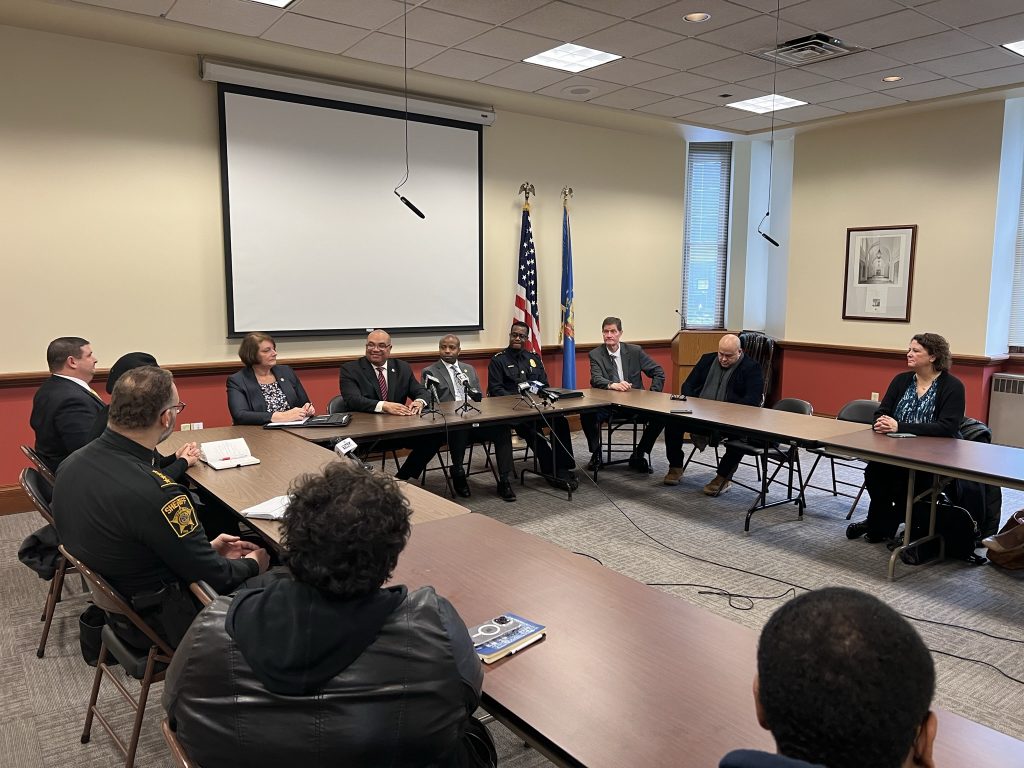How Can U.S. Marshals Help Milwaukee?
Safe surrender program, sustained community engagement are on the wish list.

U.S. Marshals Service director Ronald Davis addresses Milwaukee public safety leaders. Photo by Jeramey Jannene.
“I’m from the federal government and I’m here to help.”
It’s a phrase that U.S. Marshals Service director Ronald Davis said historically was a warning of bad things to come (at least since then-President Ronald Reagan dubbed them the “most terrifying words in the English Language.”). But at a public meeting of Milwaukee public safety leaders, Davis said the Marshals Service is trying to be a good partner.
“I’m here actually more to listen and learn and identify what we can do as the federal government. I think the worst thing we can do as the Marshals Service or any federal agency is to come in and think we are responsible and take control,” said Davis. “This is not a new partnership, but I’m here to see if we can add to it. But equally important, can we learn from it?”
Mayor Cavalier Johnson and Police Chief Jeffrey Norman thanked Davis for his interest. “Milwaukee is not alone in our challenges, unfortunately. It’s a trend nationally,” said the chief, referencing a surge in gun violence.
Milwaukee leaders have plenty of ideas for how the U.S. Marshals can help, ranging from changing the nature of how people are apprehended to becoming a more notable presence at community events.
Safe Surrender
“We need the asset that the U.S. Marshals Service provides us,” said District Attorney John Chisholm, noting that criminals cross “arbitrary lines” that divide law enforcement agencies.
Chisholm spoke in favor of the U.S. Marshals’ “Safe Surrender” program, which allows individuals with outstanding felony warrants to voluntarily surrender, avoiding high-profile, potentially dangerous arrests.
“Often times they’re able to walk back out that same day,” said Chisholm of the offenders.
“It’s not just a site where you can turn yourself in,” said Davis, explaining the program’s need for law enforcement, prosecutors and judges to be present. “The marshall here [Anna Ruzinski] has made it clear that she wants to do it.”
Ruzinski said it improves outcomes for all involved, and even those not. That includes, she said, neighbors whose lives can be disrupted and trust reduced when a large law enforcement contingent apprehends a suspect. “Our task force goes into neighborhoods, they don’t like doing that. It has an impact on the neighborhood,” said Ruzinksi.
The Safe Surrender effort started in Cleveland in 2005 and found success, but Davis, who joined the agency in 2021, said he didn’t know why it ended. It’s due to return to Cleveland this month, and he said work is well underway to bring it to Milwaukee.
Community Engagement
Milwaukee’s Office of Violence Prevention Director Ashanti Hamilton and a host of other leaders said the Marshals can help build trust.
“We all know we can’t solve this from one angle or agency,” said Medical College of Wisconsin assistant professor at the Institute for Health and Equity Constance Kostelac.
“We have children that are dealing with unresolved trauma, drug addict mothers and fathers, fathers that have been in prison. It’s clear to see that an ingredient is missing,” said Monte Mabra of Voice of the Fatherless Child. “You can bake a cake, and it looks perfect, but if there’s no sugar in it when you bite it, it doesn’t taste right.”
Hamilton said the city is also struggling with youth retaliatory violence. “Many of them are known actors,” he said, noting that trust between law enforcement and the community needs to be built so that community members turn those bad actors in before they commit additional harm. “Those that are coming in to get those young people should have a presence in the community already.” He said the community also needs to feel that justice is being served, “because otherwise, they’re going to do street justice themselves.”
Norman said he thought there was an actionable opportunity for both police officers and marshals to show up to build trust instead of just at a traumatic moment when an arrest is made.
The mayor said it would also be necessary for existing community leaders to provide information on the U.S. Marshals to the community. He said that included members of the Common Council, where both he and Hamilton previously served.
The 90-minute meeting also included other notable participants including Common Council President Jose G. Perez, Alderwoman JoCasta Zamarripa, chief deputy sheriff Daniel Hughes, Milwaukee County Executive David Crowley‘s chief of staff Mary Jo Meyers and America Works of Wisconsin child support liaison Gwendolyn Luckett.
In a media scrum after the meeting, Davis did not rule out that the agency could consider bringing Operation North Star, a 30-day apprehension program that in 2022 resulted in 1,501 fugitive arrests in 10 cities, to Milwaukee. Last year, the agency conducted “Operation Triple Beam Honey Badger” in Wisconsin, which resulted in 260 arrests of known violent offenders.
“I am confident we are looking at providing additional resources and support,” said Davis.
UPDATE: An earlier version of this article incorrectly stated Kostelac’s title.
If you think stories like this are important, become a member of Urban Milwaukee and help support real, independent journalism. Plus you get some cool added benefits.
Political Contributions Tracker
Displaying political contributions between people mentioned in this story. Learn more.
- December 13, 2017 - Ashanti Hamilton received $246 from Jeffrey Norman
- August 13, 2015 - Cavalier Johnson received $25 from David Crowley
- May 5, 2015 - José G. Pérez received $10 from Cavalier Johnson
- May 5, 2015 - José G. Pérez received $100 from JoCasta Zamarripa





















